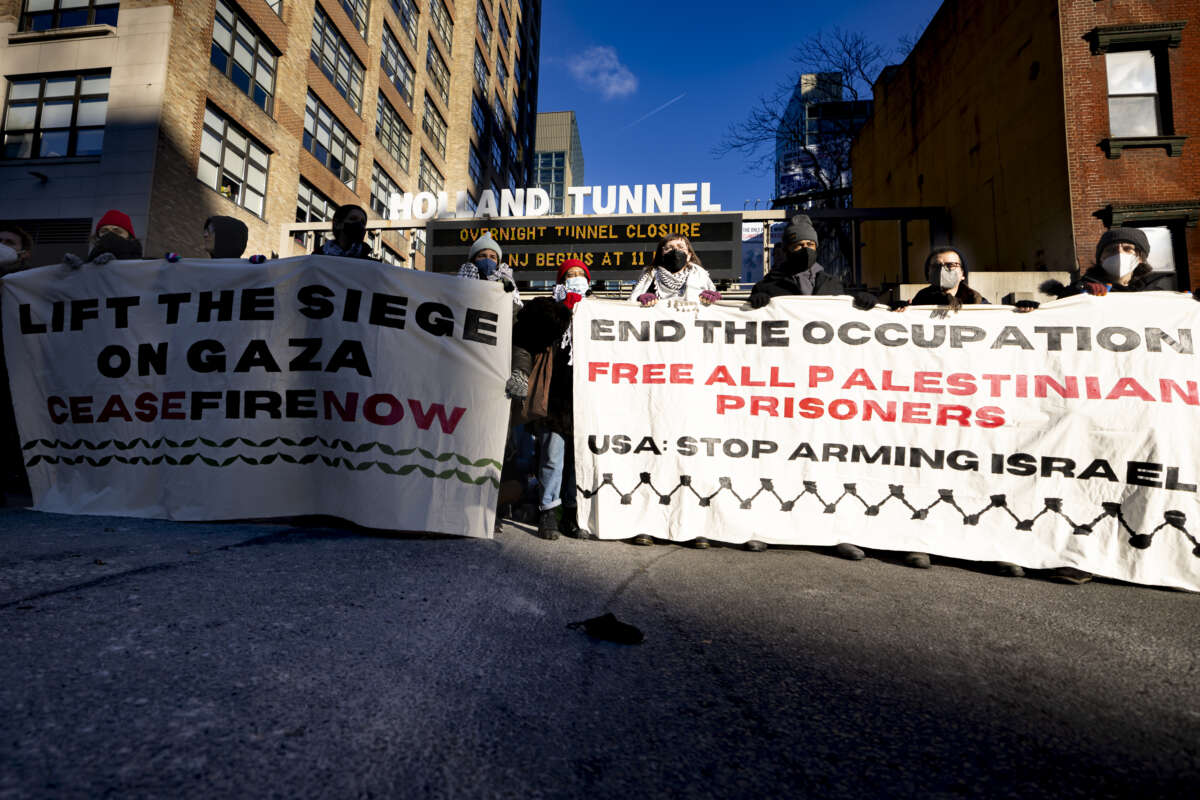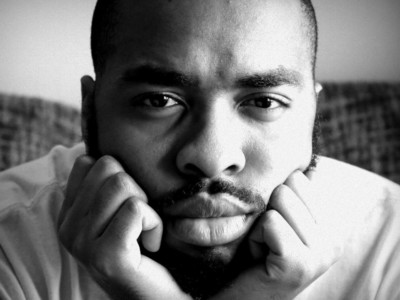We cannot rely on political bodies whose material interests are at odds with revolution.
By William C. Anderson ,
PRISM
January 13, 2024

Ilhan Omar Leads Global Call by Over 400 Parliamentarians for Gaza Ceasefire
The statement was signed by a group of lawmakers hailing from every continent.
By Sharon Zhang , TRUTHOUTJanuary 12, 2024
Appeals to U.S. representatives will ring hollow when they’re bought and paid for by lobbyists who have commitments to Israel. We must ask ourselves what we’re actually appealing to. Do our demands maintain and reiterate this world, or do they make steps toward undoing the colonial trappings we’ve been told can serve us? Anything less than a total transformation may not be enough, but the rapid politicization happening with younger generations, boycotts, and mass demonstrations tell us something significant is shifting.
These actions represent the power of people. However, radical organizers and politics should be brave enough to deal with the possibility that the number of people we thought cared about liberation and mutual aid might be much smaller than we imagine. There are times like these when we see astounding numbers of people ready to take action, only to have the channels they take action through minimize their possible impact.
If we need a recent reference point, we don’t have to look much further than the George Floyd uprisings of 2020. At a moment’s notice, abolition and calls to “defund the police” were swept into an election cycle and became “issues” on the ballot. When it was all said and done, protests died down, and the police got more funding under the auspices of COVID-19 relief and a newly elected democratic administration. The moment we begin trying to funnel this into politicians, political bodies, and the state, momentum can quickly die.
The ruling classes of the world rely on the watering down of our movements as a means of controlling dispersed communities and subjugating oppressed people. The compulsion to create emissaries to fulfill a mandate undermines us at every turn. It leaves us projecting our dreams for a better world onto people, places, and things we shouldn’t. It leads to us placing our hopes in anything that can give us a modicum of disempowered inspiration. We must always remember that true power lies in our collective force and self-determined resistance.
The new year begins with tens of thousands killed by the occupation State of Israel, thousands more unaccounted for under rubble, and 1.9 million displaced and starved. The U.S.-backed siege of Gaza and settler raids in the West Bank will certainly come into play during the upcoming election. Political establishments will use the plight of Palestinian people to sway voters. Scores of elections are set to take place across the globe that have the potential to transform the geopolitical landscape in ways never seen before. Half of the world’s population will be headed to the polls. What’s at stake is not just pivotal in terms of the Israeli occupation, but in the ongoing genocides in Sudan, Tigray, Congo, and elsewhere.
The insurmountable barrier we’re facing is that we the people do not represent ourselves and our interests directly. We shouldn’t have to “pressure” elected officials or governments, ever. This world system we’re enabling and legitimizing here in the U.S. extends its reach through partnerships with other states, including Egypt and Saudi Arabia. What would we all be able to accomplish without regimes like this getting in our way at home and abroad?
The acclaimed Gazan photojournalist Motaz Azaiza may have said it best, “Don’t call yourself a free person if you can’t make changes. If you can’t stop a genocide that is still ongoing.” This is an indictment that should push radicals in the U.S. to consider what it means to respond beyond predictable and controllable methods. Overturning this world system requires a new kind of creative thinking. The final story has not been written yet. There is still time to change the assumed conclusions.
Prism is an independent and nonprofit newsroom led by journalists of color. We report from the ground up and at the intersections of injustice.
Thank you for reading Truthout today. Your interest in bold journalism, outside the mainstream, means the world to us. Just briefly, we must ask for your help.
Truthout is funded almost entirely by its readers – you won’t see advertisements on the side of our website or funding from big corporations. Instead, what you read is powered by readers like you.
As we look to this coming year, we ask that you pledge a donation of any size once monthly to Truthout. Anything you can give ensures that we can continue publishing at this critical time, and you can cancel or change your gift at any time. (Or, you can donate just one time today. No matter what, every single cent makes a difference.)
This piece was reprinted by Truthout with permission or license. It may not be reproduced in any form without permission or license from the source.

WILLIAM C. ANDERSON is a freelance writer. His work has been published by the Guardian, Truthout, MTV and Pitchfork, among others. He’s co-author of As Black as Resistance (AK Press 2018).

Pro-Palestine protesters gather and block the entrance of the New Jersey-bound Holland Tunnel in lower Manhattan demanding Palestinian liberation and a permanent ceasefire on January 8, 2024, in New York City.
MICHAEL NIGRO / PACIFIC PRESS / LIGHTROCKET VIA GETTY IMAGES
Support justice-driven, accurate and transparent news — make a quick donation to Truthout today!
This story was originally published by Prism.
“What happened to the Palestinian nation is a shame to all of us.” – Nawal El Saadawi
The Israeli occupation of Palestine has unfolded into an escalated genocide capturing the world’s attention. Israel’s relentless bombardment of Gaza and repression in the West Bank has led millions to ask, “Why won’t anyone stop this?”
People make societies work, but yielding power to political bodies and institutions for the maintenance of those societies gives rise to a paradox: placing responsibility for revolution and even liberation in the hands of authorities whose interests are diametrically opposed to those goals. Instead, they have the ability to hold us back and distort an international predicament. The problem is that this world, which has been shaped by colonialism and violent dispossession, is not serving us. Palestine shows us why in many ways. So, dissecting U.S. interests and global capitalism and situating solidarity across borders can provide some clarity regarding how we shape a world much different from the one we currently inhabit.
The commercial and political power that allows the U.S. to assert its dominance is fortified by the modern formation of what we know as the “nation-state.” This international order augments itself through monopolies on violence, trade, and movement. After two world wars, an earth that was once organized into traditional empires saw the birth of many new independent nations. National territorial states and the aspirational hopes of sovereignty represented the best intentions of masses of people rising up against colonialism, genocide, and imperialism. Populations around the world rested their dreams for better lives in representation facilitated through statehood. The problems of treating this arrangement of political organization as quintessential for liberation movements are now laid bare.
In many people’s ideal world, the occupation of Palestine would be stopped by a conglomerate of liberated states that oppose Western dominance. It would be disrupted by pan-Arab solidarity against Zionist settler-colonial dominance. People would rise up at the helm of their states, or at least be represented by sincere leaders to push us toward a free Palestine. Global capitalism complicates and prevents this.
Countries are not able to easily intervene on behalf of Palestinian people because of ties negotiated through industry, corporations, and strategic alliances — and that’s if their administrations genuinely want to risk doing so in the first place. So, while we may see millions of people mobilizing around the globe to express their heartfelt allegiance to Palestine, governments often do not reflect the public’s will. Similarly, when we vote politicians into office in the U.S., it is no guarantee they will represent our interests or even acknowledge them. It’s a microcosm of what we see playing out globally.
Support justice-driven, accurate and transparent news — make a quick donation to Truthout today!
This story was originally published by Prism.
“What happened to the Palestinian nation is a shame to all of us.” – Nawal El Saadawi
The Israeli occupation of Palestine has unfolded into an escalated genocide capturing the world’s attention. Israel’s relentless bombardment of Gaza and repression in the West Bank has led millions to ask, “Why won’t anyone stop this?”
People make societies work, but yielding power to political bodies and institutions for the maintenance of those societies gives rise to a paradox: placing responsibility for revolution and even liberation in the hands of authorities whose interests are diametrically opposed to those goals. Instead, they have the ability to hold us back and distort an international predicament. The problem is that this world, which has been shaped by colonialism and violent dispossession, is not serving us. Palestine shows us why in many ways. So, dissecting U.S. interests and global capitalism and situating solidarity across borders can provide some clarity regarding how we shape a world much different from the one we currently inhabit.
The commercial and political power that allows the U.S. to assert its dominance is fortified by the modern formation of what we know as the “nation-state.” This international order augments itself through monopolies on violence, trade, and movement. After two world wars, an earth that was once organized into traditional empires saw the birth of many new independent nations. National territorial states and the aspirational hopes of sovereignty represented the best intentions of masses of people rising up against colonialism, genocide, and imperialism. Populations around the world rested their dreams for better lives in representation facilitated through statehood. The problems of treating this arrangement of political organization as quintessential for liberation movements are now laid bare.
In many people’s ideal world, the occupation of Palestine would be stopped by a conglomerate of liberated states that oppose Western dominance. It would be disrupted by pan-Arab solidarity against Zionist settler-colonial dominance. People would rise up at the helm of their states, or at least be represented by sincere leaders to push us toward a free Palestine. Global capitalism complicates and prevents this.
Countries are not able to easily intervene on behalf of Palestinian people because of ties negotiated through industry, corporations, and strategic alliances — and that’s if their administrations genuinely want to risk doing so in the first place. So, while we may see millions of people mobilizing around the globe to express their heartfelt allegiance to Palestine, governments often do not reflect the public’s will. Similarly, when we vote politicians into office in the U.S., it is no guarantee they will represent our interests or even acknowledge them. It’s a microcosm of what we see playing out globally.

Ilhan Omar Leads Global Call by Over 400 Parliamentarians for Gaza Ceasefire
The statement was signed by a group of lawmakers hailing from every continent.
By Sharon Zhang , TRUTHOUTJanuary 12, 2024
Appeals to U.S. representatives will ring hollow when they’re bought and paid for by lobbyists who have commitments to Israel. We must ask ourselves what we’re actually appealing to. Do our demands maintain and reiterate this world, or do they make steps toward undoing the colonial trappings we’ve been told can serve us? Anything less than a total transformation may not be enough, but the rapid politicization happening with younger generations, boycotts, and mass demonstrations tell us something significant is shifting.
These actions represent the power of people. However, radical organizers and politics should be brave enough to deal with the possibility that the number of people we thought cared about liberation and mutual aid might be much smaller than we imagine. There are times like these when we see astounding numbers of people ready to take action, only to have the channels they take action through minimize their possible impact.
If we need a recent reference point, we don’t have to look much further than the George Floyd uprisings of 2020. At a moment’s notice, abolition and calls to “defund the police” were swept into an election cycle and became “issues” on the ballot. When it was all said and done, protests died down, and the police got more funding under the auspices of COVID-19 relief and a newly elected democratic administration. The moment we begin trying to funnel this into politicians, political bodies, and the state, momentum can quickly die.
The ruling classes of the world rely on the watering down of our movements as a means of controlling dispersed communities and subjugating oppressed people. The compulsion to create emissaries to fulfill a mandate undermines us at every turn. It leaves us projecting our dreams for a better world onto people, places, and things we shouldn’t. It leads to us placing our hopes in anything that can give us a modicum of disempowered inspiration. We must always remember that true power lies in our collective force and self-determined resistance.
The new year begins with tens of thousands killed by the occupation State of Israel, thousands more unaccounted for under rubble, and 1.9 million displaced and starved. The U.S.-backed siege of Gaza and settler raids in the West Bank will certainly come into play during the upcoming election. Political establishments will use the plight of Palestinian people to sway voters. Scores of elections are set to take place across the globe that have the potential to transform the geopolitical landscape in ways never seen before. Half of the world’s population will be headed to the polls. What’s at stake is not just pivotal in terms of the Israeli occupation, but in the ongoing genocides in Sudan, Tigray, Congo, and elsewhere.
The insurmountable barrier we’re facing is that we the people do not represent ourselves and our interests directly. We shouldn’t have to “pressure” elected officials or governments, ever. This world system we’re enabling and legitimizing here in the U.S. extends its reach through partnerships with other states, including Egypt and Saudi Arabia. What would we all be able to accomplish without regimes like this getting in our way at home and abroad?
The acclaimed Gazan photojournalist Motaz Azaiza may have said it best, “Don’t call yourself a free person if you can’t make changes. If you can’t stop a genocide that is still ongoing.” This is an indictment that should push radicals in the U.S. to consider what it means to respond beyond predictable and controllable methods. Overturning this world system requires a new kind of creative thinking. The final story has not been written yet. There is still time to change the assumed conclusions.
Prism is an independent and nonprofit newsroom led by journalists of color. We report from the ground up and at the intersections of injustice.
Thank you for reading Truthout today. Your interest in bold journalism, outside the mainstream, means the world to us. Just briefly, we must ask for your help.
Truthout is funded almost entirely by its readers – you won’t see advertisements on the side of our website or funding from big corporations. Instead, what you read is powered by readers like you.
As we look to this coming year, we ask that you pledge a donation of any size once monthly to Truthout. Anything you can give ensures that we can continue publishing at this critical time, and you can cancel or change your gift at any time. (Or, you can donate just one time today. No matter what, every single cent makes a difference.)
This piece was reprinted by Truthout with permission or license. It may not be reproduced in any form without permission or license from the source.

WILLIAM C. ANDERSON is a freelance writer. His work has been published by the Guardian, Truthout, MTV and Pitchfork, among others. He’s co-author of As Black as Resistance (AK Press 2018).
No comments:
Post a Comment